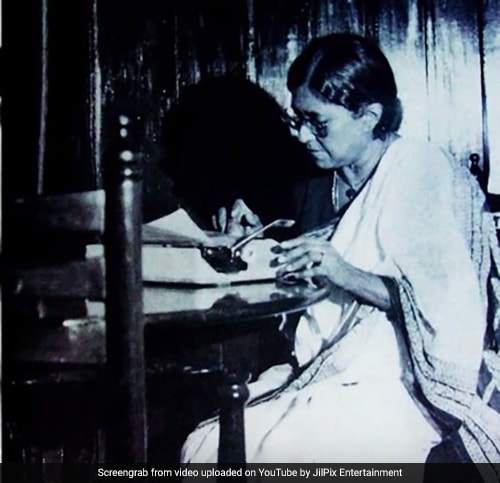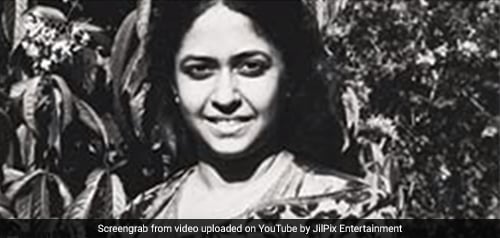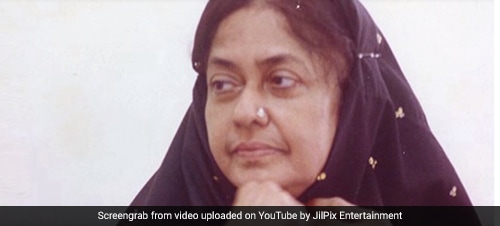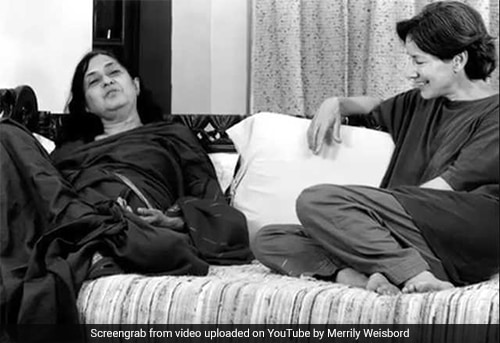
January was a good month for feminists and Indians on Googles iconic doodles. After Virginia Woolf (January 25), Mahashweta Devi (January 14), Fearless Nadia (January 8) and Emma Ihrer (January 3), Google kickstarted February by honouring Indian firebrand feminist writer Kamala Das by immortalising her with a Google Doodle. And not a day too soon, considering that just two days ago, a petition was filed in the Kerala high court to stop Aami, a Malayalam film based on the life of the legendary writer. The (questionable) logic: it promotes "love jihad".
Born on 31st March, 1934 in Kerala, Kamala Das lived a culturally enriched childhood, thanks to the influence of literary luminaries like Balamani Amma (her mother) and Nalapat Narayana Menon (her grand uncle) in her early years. Her love for writing began at a very young age. At the age of six, Ms Das created a rudimentary magazine of poems, where she would write sad poems about dolls that had lost their heads and were doomed to remain headless for eternity. The early years of her life were spent shuttling between her native home in Kerala and Calcutta, where her father, VM Nair, was posted for work.

At the age of 15, Ms Das was married to a banker officer - Madhava Das - much older than herself. The couple moved to the erstwhile Bombay, which is where Ms Das took to writing professionally, on being encouraged by her husband, even as she struggled with juggling the duties and expectations from a housewife.
Kamala Das wrote extensively and in explicit detail. Most of her writing in Malayalam was written under the pen name of Madhavikutty. Her writing, whether in English or Malayalam, had strong feminist leanings and she didn't shy away from discussing sex and sexuality in her stories and poems. They also often borrowed words and phrases from each other. One of her earliest published works, Sthree, a story that was published in Mathrubhumi Weekly in 1947, when Ms Das as barely 13, had lesbianism as its central theme.
Through the 50s and 60s, she continued writing in her signature confessional and graphic writing style, talking about women's issues - struggling with sexism, understanding and experimenting with their own sexuality, childbirth, love, desire, loneliness, being stifled, emotional disillusionment, etc., leaving readers either awestruck or angered. Indian literature in the 1950s and 60s, and even 70s had not evolved enough to accept, without struggle, the language of a woman who had decided to lay her life and its longings bare. Her undeterred style and volume of poetry-writing led her to earn the label of 'The Mother Of Modern English Indian Poetry' and comparisons to poetry greats like Sylvia Plath and Marguerite Duras.

In 1972, when her family was faced with financial trouble, Ms. Das had to focus her energies on writing columns, because they paid better. She started writing for a popular Malayalam weekly, Malayalanadu, in the same brutally honest tone of voice and on controversial subjects.
A compilation of Ms Das columns was published in 1973 as Ente Katha, an autobiography. It was a serialised version of her ruminations about her teenage love for a neighbour, her feelings towards her failed arranged marriage, the birth of her children, the extramarital affairs she had, and even experiments with sexuality. Although the book was a success, it invited the wrath of several family members and led to strained relationships within the family. There was even pressure from influential relatives on the editor of Malayalanadu to stop publishing Ms Das' work, but neither he, nor she caved.
In 1977, Ente Katha as translated into English, while borrowing from the 1970 memoir she had started writing in English, but had later converted to Malayalam and used as the raw material for her column. The English version of Ms Das' autobiography, My Story, too was a considered a literary sensation and remains one of the most popular and controversial autobiographies by an Indian author. Despite the books' success, in subsequent years, Kamala Das admitted that they contained many fictional elements and plots and were not entirely autobiographical in nature.

Even as Ms Das' popularity and list of awards grew - she has won the prestigious Sahitya Akademi award, Asian World Prize, Kent Award, Asian Poetry Prize, Ezhuthachan Puraskaram, and many others - so did her tryst with controversies and contradictions. In 1999, at the age of 65, Kamala Das converted to Islam and assumed the name Kamala Surayya, which is why "love jihad" is currently being debated as a relevant part of Ms Das' narrative.
Love jihad, for the uninitiated, is the term given to a supposed form of religious propaganda and indoctrination carried out with the help of Muslim men feigning love to Hindu women to lure them away from their faith and convert them to Islam. However, in an interview with Islamic Bulletin soon after her conversion, Kamala Das, or Surayya, was quoted as saying, "I had discussed my strong feelings about Islam with my husband. He advised me not to treat the issue lightly. He felt religion could not be changed as easily as we change our clothes. He advised me to study it deeply and only then take a decision... I thought about it a lot. I have been nurturing the idea in my mind for the last 27 years. I had been thinking about conversion for the last seven years, but put off my decision for one reason or another."
While her decision to convert to Islam angered many within Kerala's Hindu literary circle, earning her death threats from radical Hindu right wing organisations, Ms Das continued to defend it as an exercise in exerting one's will and her right to make a choice best-suited for her. However, in the twilight years of her life, in an interview with The Hindu, she admitted that she regretted making the decision. "I fell in love with a Muslim (man) after my husband's death. He was kind and generous in the beginning. But I now feel one shouldn't change one's religion. It is not worth it."

The Love Queen Of Malabar, a book that explored intimate details of Ms Das' life by Merrily Weisbord, quotes Ms Das talking about Sadiq Ali, her 38-year-old Muslim lover who asked her to convert.
Kamala Das died in May 2009, at the age of 75, in Pune. Her body was flown to Kerala, her home state and was buried at the Palayam Jama Masjid at Thiruvananthapuram with full state honour. She is survived by three sons - Madhav Das Nalapat (also a writer and journalist), Chinnen Das and Jayasurya Das.
Track Latest News Live on NDTV.com and get news updates from India and around the world
